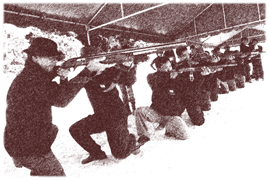4,500 baht employment project (the first of a three-part series)
 To most people who live outside the three violence-prone southernmost provinces, the name of the project, "4,500 baht urgent employment project", may not ring a bell. But to the locals down there, the project is quite popular that many people want to have a piece of it because of the easy money.
To most people who live outside the three violence-prone southernmost provinces, the name of the project, "4,500 baht urgent employment project", may not ring a bell. But to the locals down there, the project is quite popular that many people want to have a piece of it because of the easy money.
Initiated in 2005 by then Thaksin government, the project was born out of the belief that unemployment was one of the major factors that drove several misguided Muslim youths in the deep South to join the insurgency movement. So, in order to nib the problem in the bud, jobs were created so that these youths were hired and hence lured away from the insurgency recruiters.
Besides security reason, the project also aimed to stimulate the local economy hard hit by the seemingly endless violence perpetrated by insurgents.
On the first year of the launch of the project, up to 44,000 "jobs" were created. But however the number has gradually declined over the years to just 24,710 last year. The monthly budget earmarked for the project was estimated at about 111 million baht or 1.3 billion baht annually.
Originally, the project was under the responsibility of the Southern Border Provinces Peace-keeping Directorate. But this responsibility has, in recent years, been shifted to the 4th region (forward) of the Internal Security Operations Command.
In practice, the number of "jobs" created are allocated among governmental agencies in the region. For instances in 2008- 2009, the military was granted a quota of 8,285 "jobs" which were broken down into the followings: 1,869 in Yala, 2,475 in Pattani, 2,904 in Narathiwat and 1,037 in Songkhla.
With the "jobs" granted, this means that the military could hire up to 8,285 employees at 4,500 baht per head/ per month. In theory, this may be a boost to the local economy as the locals will be employed and get paid so they will be able to support their families.
In reality however, ordinary job-seekers were not the real beneficiaries of the project. The "jobs" were, in many cases, given to friends, relatives or people connected with the military officers or local officials who were authorized to give away the "jobs". It was discovered that there have been several instances of people getting paid on monthly basis but practically without any jobs to do.
Speaking on condition of anonymity, a mayor in Yala province recently told the Isra news team that each year that his municipal was granted a quota of "jobs" from the project, he would be approached by local politicians or officials who asked to have their relatives hired so they will get paid. He said that many employees thought that they were not supposed to do anything and the salary was just a free handout.
Regarding the job quota reserved for non-governmental organizations operating in the deep South, it was discovered that some NGOs were set up just to receive the job quota with collaboration from corrupt officials. In which case, a list of ghost employees was drawn up to claim the monthly pay.
It was also discovered that some unscrupulous NGOs which were granted the job quota had deceived newly-graduated students who were unemployed to work for them on temporary basis. The students were not paid the full amount of 4,500 baht with the NGO managers making a cut from the amount.
Colonel Thakorn Niamrin of ISOC’s 4th region (Forward) admitted that there were many loopholes in the implementation of the project during the first few years. He said that there were too many "jobs" and many of the employees did not actually work to deserve the pay.
Adjustments have been made to the project which has now aimed at three groups of people: people affected by violence; people tasked with maintaining peace in communities and youths who want occupational training.
As for the second group of people targeted by the project, the colonel disclosed that the military had been assigned to recruit the employees for peace-keeping job. Twenty people will be recruited for each community and their task is to protect their community against insurgents. So far, 900 villages have been equipped with these security guards.
There is however a down side of the project. Associate Professor Nukul Rattanadakul of Prince of Songkhla University’s Pattani campus, said that the 4,500 baht employment project had driven a wedge among villagers in various communities with those who were not employed felt that they were not fairly treated. He said that many villagers wanted the "jobs" because of the easy money and they did not have to work much.
The professor suggested that the project would focus on strengthening the communities rather than emphasizing too much on security.
------------------------------------------------------------------------------------------------------------
Caption : Some employees were recruited by military for peace-keeping job.
